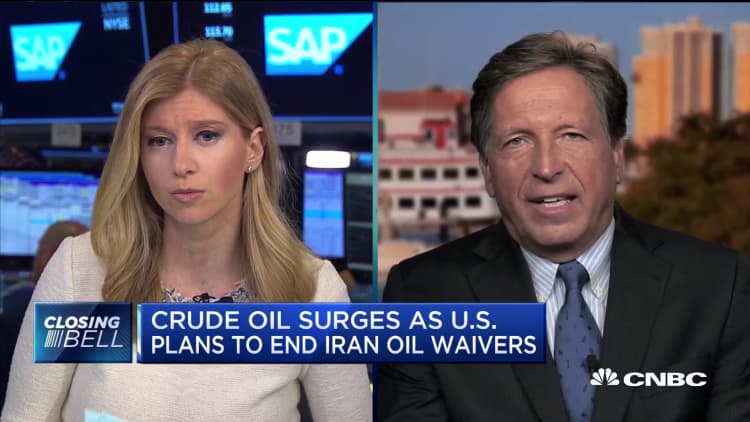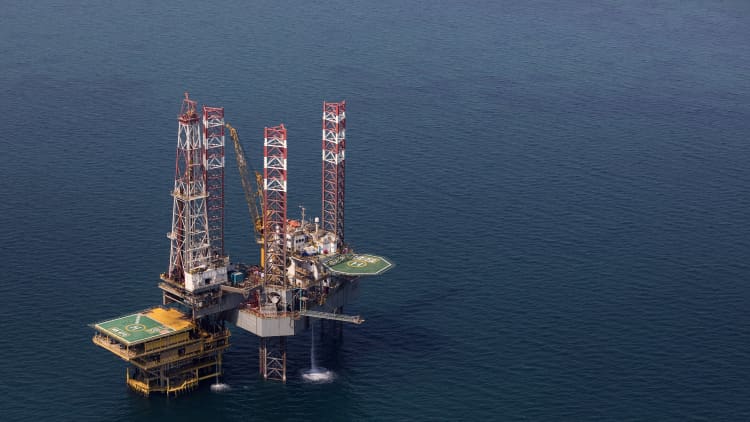
President Donald Trump's goal of bringing Iran to its knees threatens to exact a heavy toll on American drivers this summer, fuel analysts warn.
The White House surprised the oil market on Monday, announcing new measures aimed at driving Iran's crude exports to zero in just over a week. The sudden policy shift comes on the heels of nine straight weeks of rising U.S. gasoline prices and at the outset of the annual uptick in gasoline demand.
The national average for regular gasoline has finally paused at $2.84 a gallon, following the roughly two-month rally, according to fuel price technology firm GasBuddy. While prices continued to bubble higher in most states last week, the pace of has finally slowed.
But the Trump administration's shock decision to end all sanctions waivers for Iran's oil buyers may cause another round of gas price increases, creating a "more painful summer at the pump," said Patrick DeHaan, head of petroleum analysis for GasBuddy.
Gas prices across the US, source: GasBuddy
The Trump administration is relying on Saudi Arabia, the United Arab Emirates and other OPEC members to hike output and prevent a price spike. But analysts say the producers are fearful of sparking a repeat of last year's oil price crash, and will likely proceed with caution rather than open the taps.
"With such a policy move, if OPEC fails to increase output to offset the likely drop from an end to Iran waivers, expect oil prices to continue to surge. This will cost Americans billions if the Administration enforces the end to waivers," DeHaan said.
Oil prices, which account for more than half of the cost of gasoline, have already surged more than 3% to nearly six-month highs since Trump announced the decision. The move now threatens to push prices at the pump past key psychological levels and ding drivers in the pocketbook.
"U.S. consumers could be staring down a $3 per gallon national average now, at least for a time as we get into the start of the summer driving season. That's going to hit consumer confidence," John Kilduff, partner at energy hedge fund Again Capital told CNBC's "Squawk Box" on Monday.
Consumers may not feel that pinch immediately because wages are rising, said Savita Subramanian, head of U.S. equity and quantitative strategy at Bank of America Merrill Lynch. But with California's gas prices hovering above $4 a gallon, "we're getting to a point where this could turn ugly."

Ahead of a contentious 2020 presidential election, the pain at the pump is starting to spread beyond blue states, according to Tom Kloza, global head of energy analysis at Oil Price Information Service.
"There's probably a half dozen states that the president needs to carry in the next election which are going to go above $3 a gallon in this driving season," he told CNBC's "Closing Bell" on Monday.
Kloza said the timing of the Iran policy shift was "very inelegant to say the least." Gas prices are already lofty because of refinery outages, and refineries will soon hike crude oil processing by 1 million-1.5 million barrels per day to meet summer gas demand.
On top of that, U.S. oil production is still being held back by a shortage of pipelines in the Permian Basin, the epicenter of the U.S. drilling renaissance. Those bottlenecks won't clear until the second half of the year.
"All of this is happening with near chaos in Libya, trouble in Nigeria and total chaos in Venezuela," Kloza said. "We had some time. Probably if this happened five months from now we'd be in a lot better shape because the U.S. will be producing another million barrels a day of crude."


